Critical Evaluation of Financial Accounting Theories: ACC3AFA
VerifiedAdded on 2022/09/06
|7
|1246
|25
Report
AI Summary
This report critically evaluates financial accounting theories, focusing on the 'free-market' and 'pro-regulation' perspectives concerning accounting information regulation. It presents arguments for both viewpoints, analyzing the role of government and market forces. The report further examines organizational legitimacy and stakeholder theory as frameworks for evaluating social and environmental accounting, comparing and contrasting their approaches to sustainability. It explores the strengths and weaknesses of each theory in explaining the practice of social and environmental accounting, considering their application in corporate contexts. The report includes detailed discussions, relevant referencing, and a comprehensive analysis of the conceptual background of accounting practice and regulation.
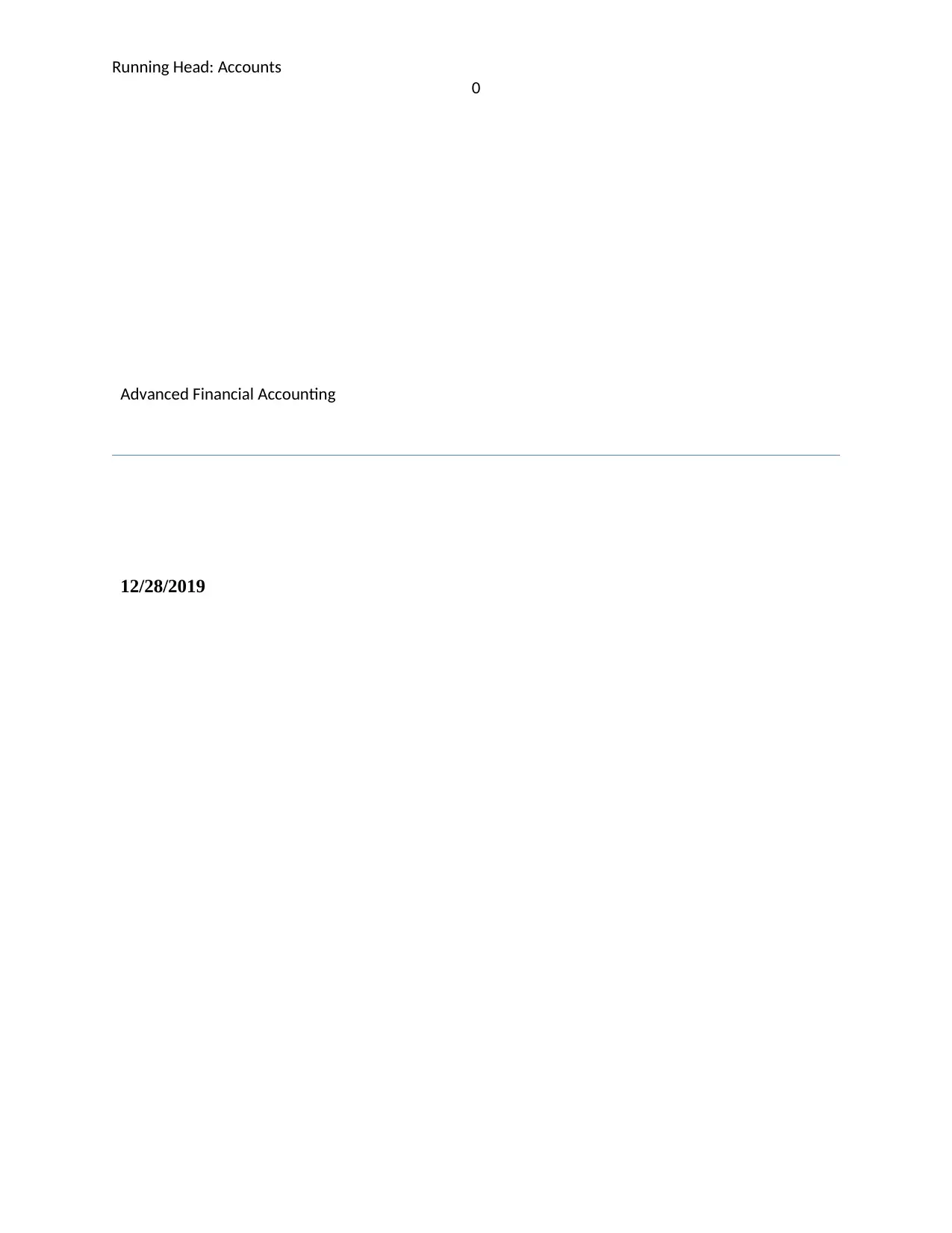
Running Head: Accounts
0
Advanced Financial Accounting
12/28/2019
0
Advanced Financial Accounting
12/28/2019
Paraphrase This Document
Need a fresh take? Get an instant paraphrase of this document with our AI Paraphraser
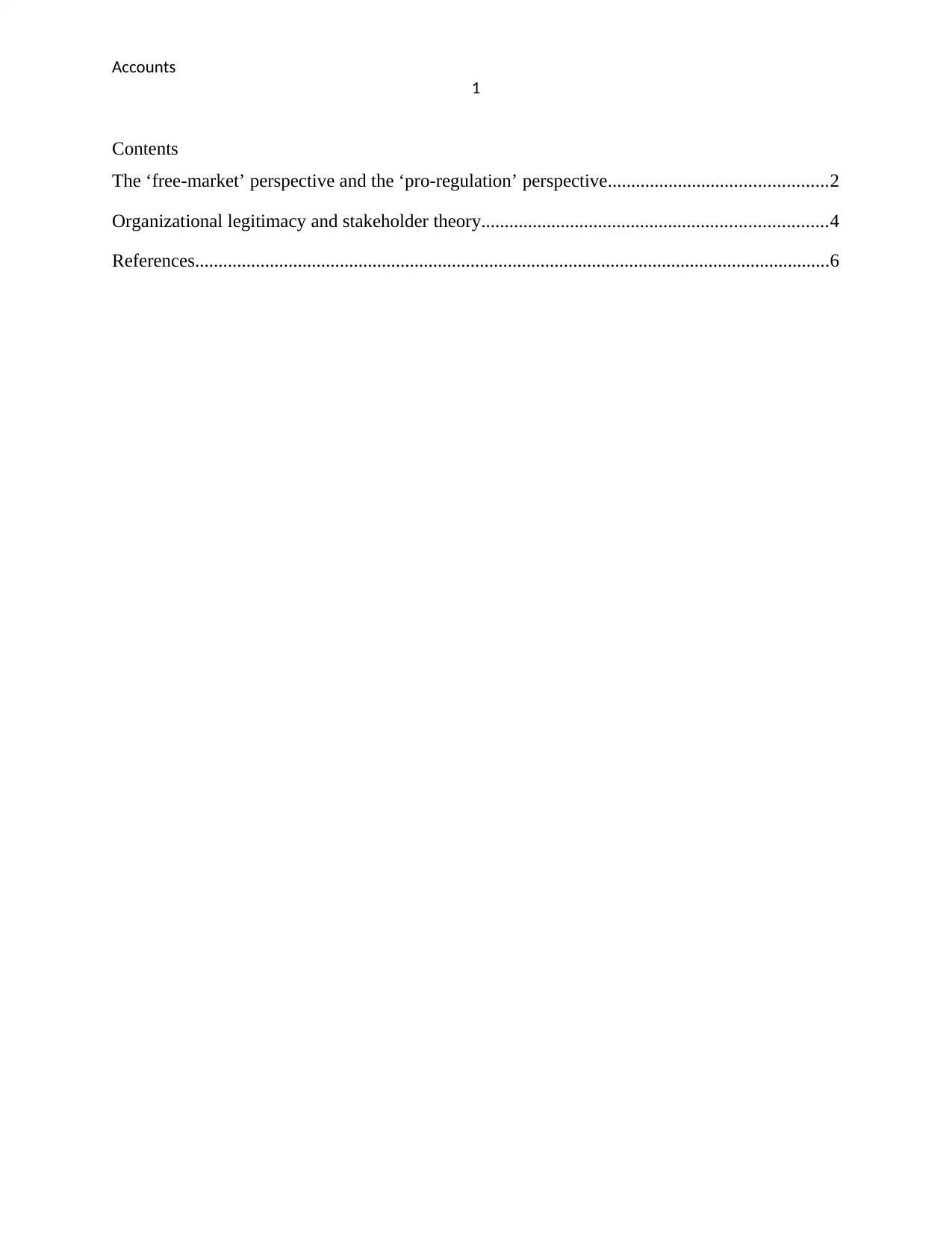
Accounts
1
Contents
The ‘free-market’ perspective and the ‘pro-regulation’ perspective...............................................2
Organizational legitimacy and stakeholder theory..........................................................................4
References........................................................................................................................................6
1
Contents
The ‘free-market’ perspective and the ‘pro-regulation’ perspective...............................................2
Organizational legitimacy and stakeholder theory..........................................................................4
References........................................................................................................................................6
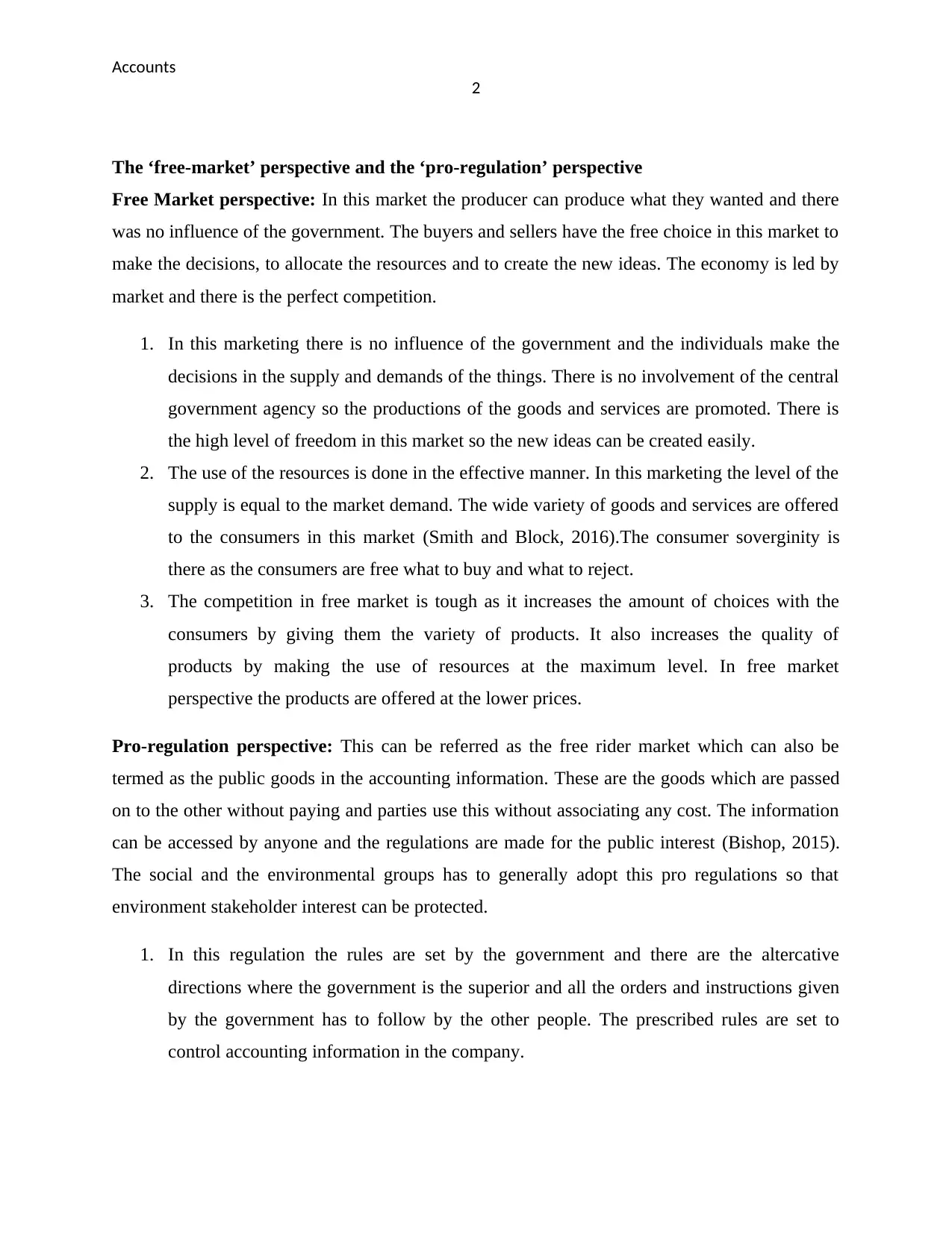
Accounts
2
The ‘free-market’ perspective and the ‘pro-regulation’ perspective
Free Market perspective: In this market the producer can produce what they wanted and there
was no influence of the government. The buyers and sellers have the free choice in this market to
make the decisions, to allocate the resources and to create the new ideas. The economy is led by
market and there is the perfect competition.
1. In this marketing there is no influence of the government and the individuals make the
decisions in the supply and demands of the things. There is no involvement of the central
government agency so the productions of the goods and services are promoted. There is
the high level of freedom in this market so the new ideas can be created easily.
2. The use of the resources is done in the effective manner. In this marketing the level of the
supply is equal to the market demand. The wide variety of goods and services are offered
to the consumers in this market (Smith and Block, 2016).The consumer soverginity is
there as the consumers are free what to buy and what to reject.
3. The competition in free market is tough as it increases the amount of choices with the
consumers by giving them the variety of products. It also increases the quality of
products by making the use of resources at the maximum level. In free market
perspective the products are offered at the lower prices.
Pro-regulation perspective: This can be referred as the free rider market which can also be
termed as the public goods in the accounting information. These are the goods which are passed
on to the other without paying and parties use this without associating any cost. The information
can be accessed by anyone and the regulations are made for the public interest (Bishop, 2015).
The social and the environmental groups has to generally adopt this pro regulations so that
environment stakeholder interest can be protected.
1. In this regulation the rules are set by the government and there are the altercative
directions where the government is the superior and all the orders and instructions given
by the government has to follow by the other people. The prescribed rules are set to
control accounting information in the company.
2
The ‘free-market’ perspective and the ‘pro-regulation’ perspective
Free Market perspective: In this market the producer can produce what they wanted and there
was no influence of the government. The buyers and sellers have the free choice in this market to
make the decisions, to allocate the resources and to create the new ideas. The economy is led by
market and there is the perfect competition.
1. In this marketing there is no influence of the government and the individuals make the
decisions in the supply and demands of the things. There is no involvement of the central
government agency so the productions of the goods and services are promoted. There is
the high level of freedom in this market so the new ideas can be created easily.
2. The use of the resources is done in the effective manner. In this marketing the level of the
supply is equal to the market demand. The wide variety of goods and services are offered
to the consumers in this market (Smith and Block, 2016).The consumer soverginity is
there as the consumers are free what to buy and what to reject.
3. The competition in free market is tough as it increases the amount of choices with the
consumers by giving them the variety of products. It also increases the quality of
products by making the use of resources at the maximum level. In free market
perspective the products are offered at the lower prices.
Pro-regulation perspective: This can be referred as the free rider market which can also be
termed as the public goods in the accounting information. These are the goods which are passed
on to the other without paying and parties use this without associating any cost. The information
can be accessed by anyone and the regulations are made for the public interest (Bishop, 2015).
The social and the environmental groups has to generally adopt this pro regulations so that
environment stakeholder interest can be protected.
1. In this regulation the rules are set by the government and there are the altercative
directions where the government is the superior and all the orders and instructions given
by the government has to follow by the other people. The prescribed rules are set to
control accounting information in the company.
⊘ This is a preview!⊘
Do you want full access?
Subscribe today to unlock all pages.

Trusted by 1+ million students worldwide
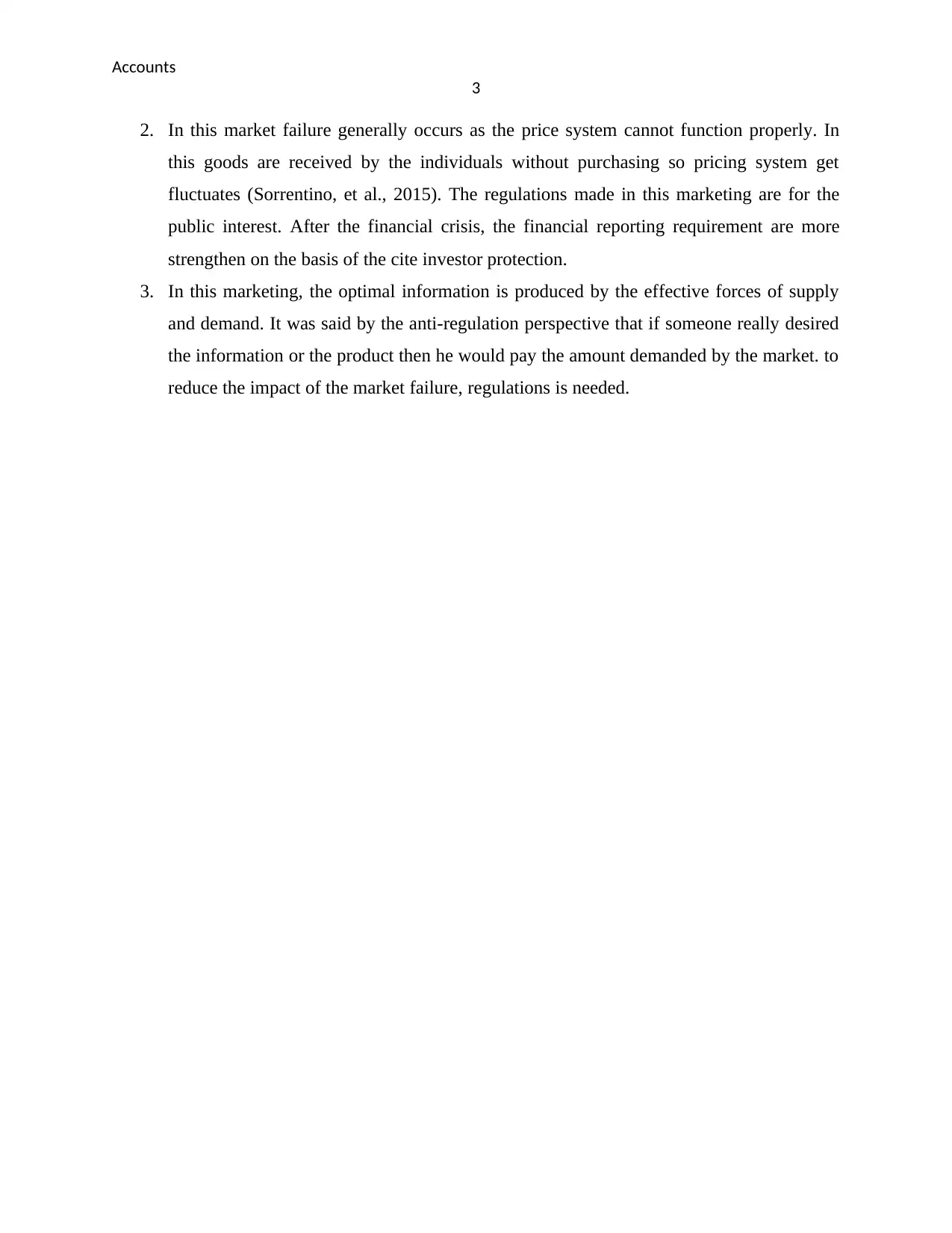
Accounts
3
2. In this market failure generally occurs as the price system cannot function properly. In
this goods are received by the individuals without purchasing so pricing system get
fluctuates (Sorrentino, et al., 2015). The regulations made in this marketing are for the
public interest. After the financial crisis, the financial reporting requirement are more
strengthen on the basis of the cite investor protection.
3. In this marketing, the optimal information is produced by the effective forces of supply
and demand. It was said by the anti-regulation perspective that if someone really desired
the information or the product then he would pay the amount demanded by the market. to
reduce the impact of the market failure, regulations is needed.
3
2. In this market failure generally occurs as the price system cannot function properly. In
this goods are received by the individuals without purchasing so pricing system get
fluctuates (Sorrentino, et al., 2015). The regulations made in this marketing are for the
public interest. After the financial crisis, the financial reporting requirement are more
strengthen on the basis of the cite investor protection.
3. In this marketing, the optimal information is produced by the effective forces of supply
and demand. It was said by the anti-regulation perspective that if someone really desired
the information or the product then he would pay the amount demanded by the market. to
reduce the impact of the market failure, regulations is needed.
Paraphrase This Document
Need a fresh take? Get an instant paraphrase of this document with our AI Paraphraser
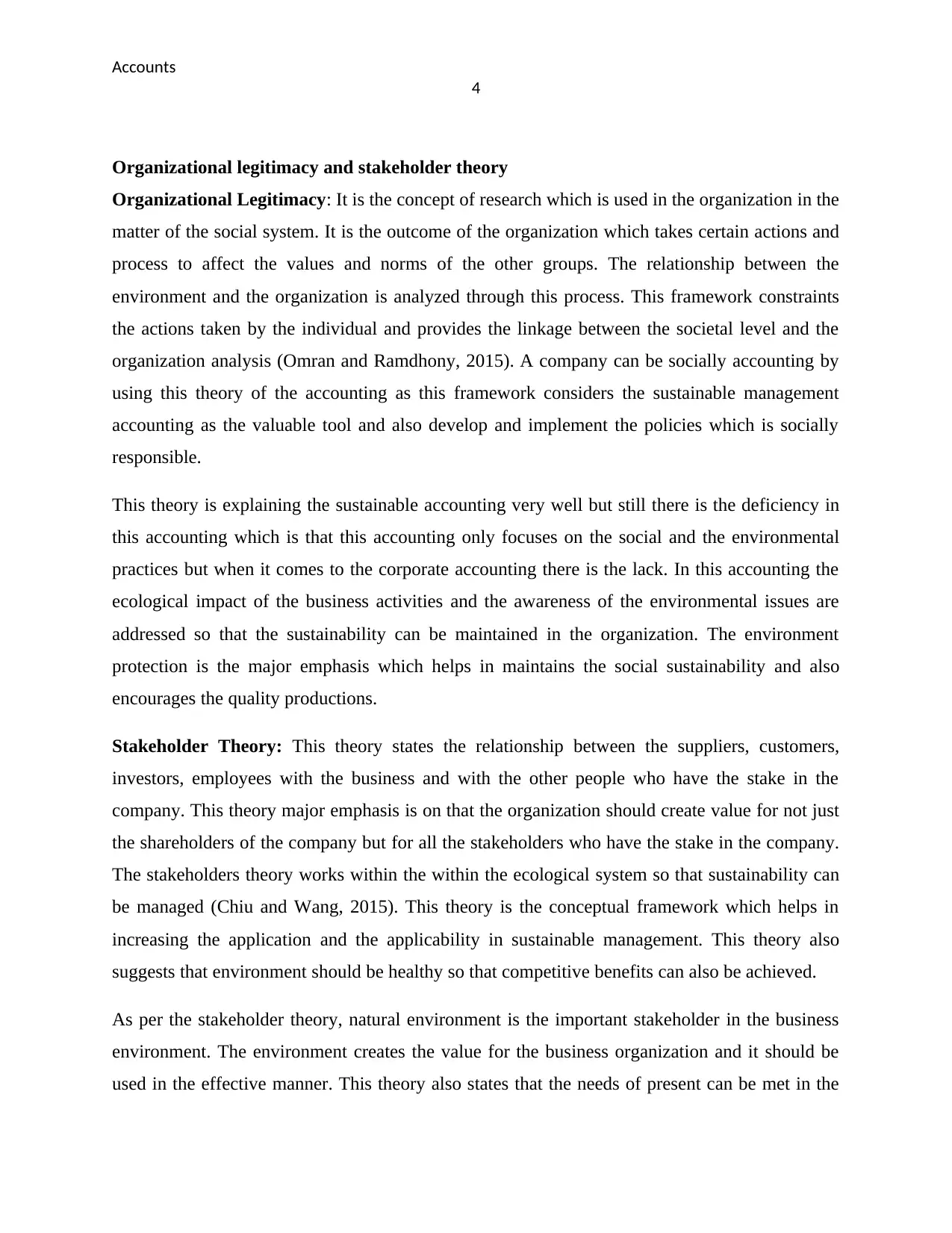
Accounts
4
Organizational legitimacy and stakeholder theory
Organizational Legitimacy: It is the concept of research which is used in the organization in the
matter of the social system. It is the outcome of the organization which takes certain actions and
process to affect the values and norms of the other groups. The relationship between the
environment and the organization is analyzed through this process. This framework constraints
the actions taken by the individual and provides the linkage between the societal level and the
organization analysis (Omran and Ramdhony, 2015). A company can be socially accounting by
using this theory of the accounting as this framework considers the sustainable management
accounting as the valuable tool and also develop and implement the policies which is socially
responsible.
This theory is explaining the sustainable accounting very well but still there is the deficiency in
this accounting which is that this accounting only focuses on the social and the environmental
practices but when it comes to the corporate accounting there is the lack. In this accounting the
ecological impact of the business activities and the awareness of the environmental issues are
addressed so that the sustainability can be maintained in the organization. The environment
protection is the major emphasis which helps in maintains the social sustainability and also
encourages the quality productions.
Stakeholder Theory: This theory states the relationship between the suppliers, customers,
investors, employees with the business and with the other people who have the stake in the
company. This theory major emphasis is on that the organization should create value for not just
the shareholders of the company but for all the stakeholders who have the stake in the company.
The stakeholders theory works within the within the ecological system so that sustainability can
be managed (Chiu and Wang, 2015). This theory is the conceptual framework which helps in
increasing the application and the applicability in sustainable management. This theory also
suggests that environment should be healthy so that competitive benefits can also be achieved.
As per the stakeholder theory, natural environment is the important stakeholder in the business
environment. The environment creates the value for the business organization and it should be
used in the effective manner. This theory also states that the needs of present can be met in the
4
Organizational legitimacy and stakeholder theory
Organizational Legitimacy: It is the concept of research which is used in the organization in the
matter of the social system. It is the outcome of the organization which takes certain actions and
process to affect the values and norms of the other groups. The relationship between the
environment and the organization is analyzed through this process. This framework constraints
the actions taken by the individual and provides the linkage between the societal level and the
organization analysis (Omran and Ramdhony, 2015). A company can be socially accounting by
using this theory of the accounting as this framework considers the sustainable management
accounting as the valuable tool and also develop and implement the policies which is socially
responsible.
This theory is explaining the sustainable accounting very well but still there is the deficiency in
this accounting which is that this accounting only focuses on the social and the environmental
practices but when it comes to the corporate accounting there is the lack. In this accounting the
ecological impact of the business activities and the awareness of the environmental issues are
addressed so that the sustainability can be maintained in the organization. The environment
protection is the major emphasis which helps in maintains the social sustainability and also
encourages the quality productions.
Stakeholder Theory: This theory states the relationship between the suppliers, customers,
investors, employees with the business and with the other people who have the stake in the
company. This theory major emphasis is on that the organization should create value for not just
the shareholders of the company but for all the stakeholders who have the stake in the company.
The stakeholders theory works within the within the ecological system so that sustainability can
be managed (Chiu and Wang, 2015). This theory is the conceptual framework which helps in
increasing the application and the applicability in sustainable management. This theory also
suggests that environment should be healthy so that competitive benefits can also be achieved.
As per the stakeholder theory, natural environment is the important stakeholder in the business
environment. The environment creates the value for the business organization and it should be
used in the effective manner. This theory also states that the needs of present can be met in the
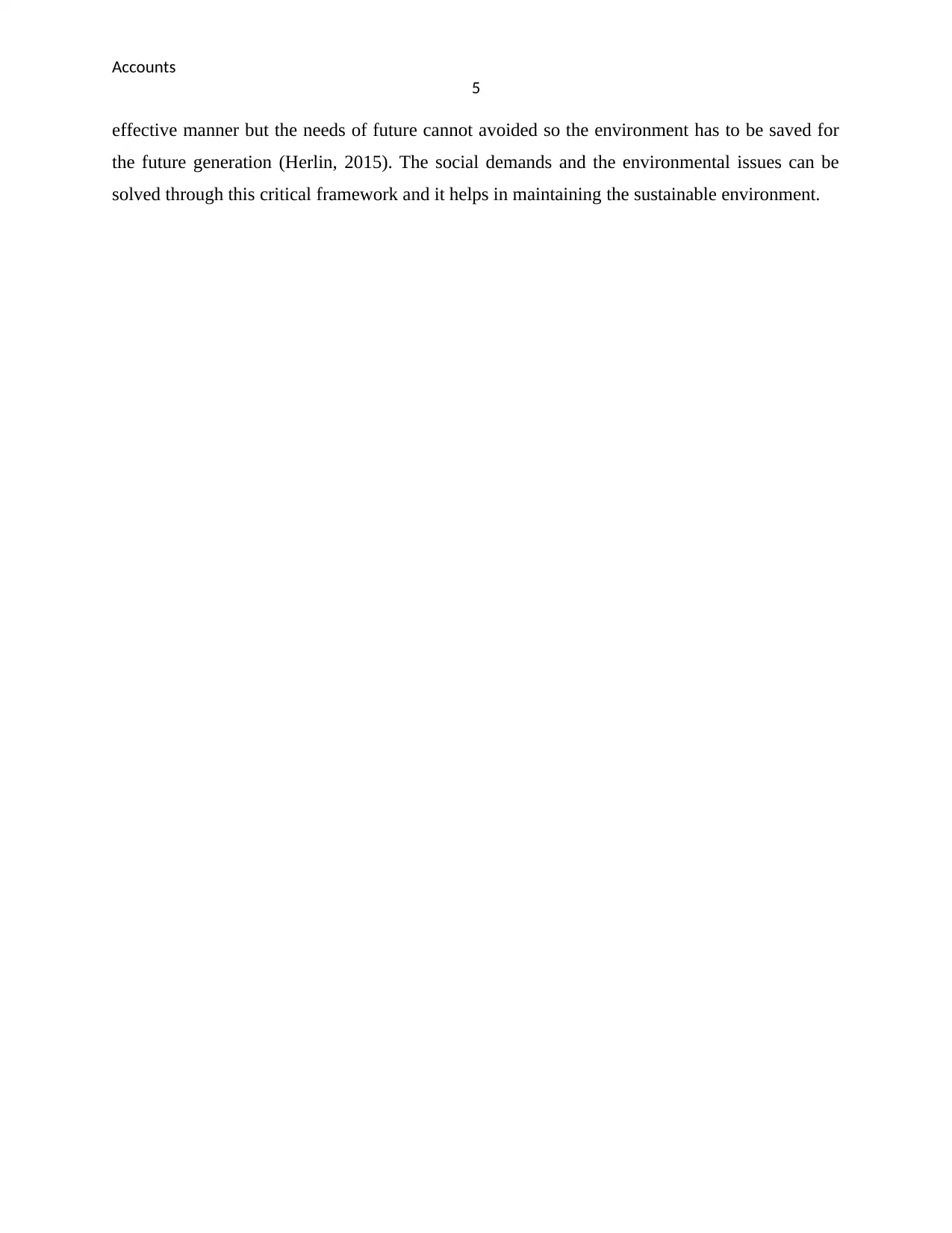
Accounts
5
effective manner but the needs of future cannot avoided so the environment has to be saved for
the future generation (Herlin, 2015). The social demands and the environmental issues can be
solved through this critical framework and it helps in maintaining the sustainable environment.
5
effective manner but the needs of future cannot avoided so the environment has to be saved for
the future generation (Herlin, 2015). The social demands and the environmental issues can be
solved through this critical framework and it helps in maintaining the sustainable environment.
⊘ This is a preview!⊘
Do you want full access?
Subscribe today to unlock all pages.

Trusted by 1+ million students worldwide
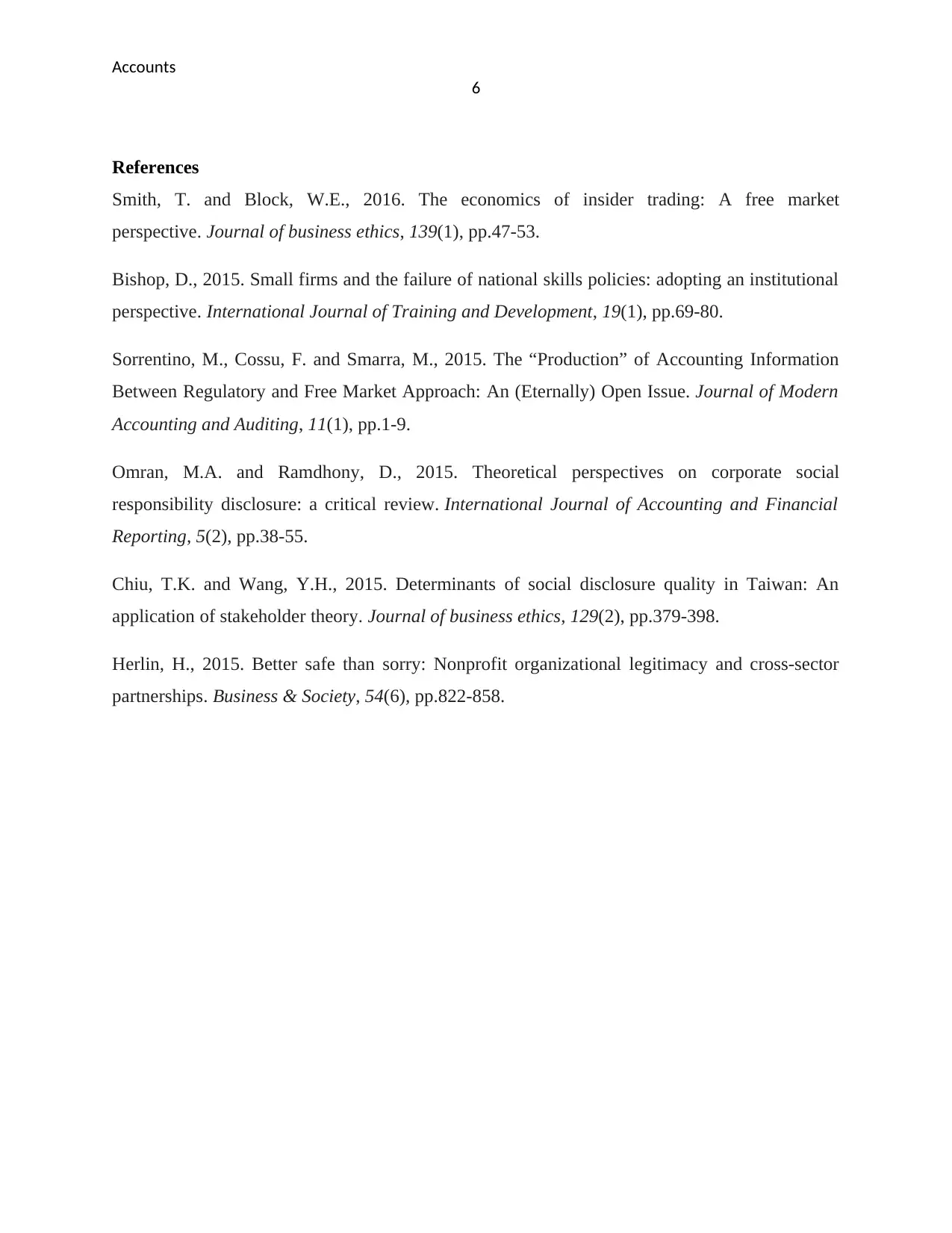
Accounts
6
References
Smith, T. and Block, W.E., 2016. The economics of insider trading: A free market
perspective. Journal of business ethics, 139(1), pp.47-53.
Bishop, D., 2015. Small firms and the failure of national skills policies: adopting an institutional
perspective. International Journal of Training and Development, 19(1), pp.69-80.
Sorrentino, M., Cossu, F. and Smarra, M., 2015. The “Production” of Accounting Information
Between Regulatory and Free Market Approach: An (Eternally) Open Issue. Journal of Modern
Accounting and Auditing, 11(1), pp.1-9.
Omran, M.A. and Ramdhony, D., 2015. Theoretical perspectives on corporate social
responsibility disclosure: a critical review. International Journal of Accounting and Financial
Reporting, 5(2), pp.38-55.
Chiu, T.K. and Wang, Y.H., 2015. Determinants of social disclosure quality in Taiwan: An
application of stakeholder theory. Journal of business ethics, 129(2), pp.379-398.
Herlin, H., 2015. Better safe than sorry: Nonprofit organizational legitimacy and cross-sector
partnerships. Business & Society, 54(6), pp.822-858.
6
References
Smith, T. and Block, W.E., 2016. The economics of insider trading: A free market
perspective. Journal of business ethics, 139(1), pp.47-53.
Bishop, D., 2015. Small firms and the failure of national skills policies: adopting an institutional
perspective. International Journal of Training and Development, 19(1), pp.69-80.
Sorrentino, M., Cossu, F. and Smarra, M., 2015. The “Production” of Accounting Information
Between Regulatory and Free Market Approach: An (Eternally) Open Issue. Journal of Modern
Accounting and Auditing, 11(1), pp.1-9.
Omran, M.A. and Ramdhony, D., 2015. Theoretical perspectives on corporate social
responsibility disclosure: a critical review. International Journal of Accounting and Financial
Reporting, 5(2), pp.38-55.
Chiu, T.K. and Wang, Y.H., 2015. Determinants of social disclosure quality in Taiwan: An
application of stakeholder theory. Journal of business ethics, 129(2), pp.379-398.
Herlin, H., 2015. Better safe than sorry: Nonprofit organizational legitimacy and cross-sector
partnerships. Business & Society, 54(6), pp.822-858.
1 out of 7
Related Documents
Your All-in-One AI-Powered Toolkit for Academic Success.
+13062052269
info@desklib.com
Available 24*7 on WhatsApp / Email
![[object Object]](/_next/static/media/star-bottom.7253800d.svg)
Unlock your academic potential
Copyright © 2020–2025 A2Z Services. All Rights Reserved. Developed and managed by ZUCOL.





